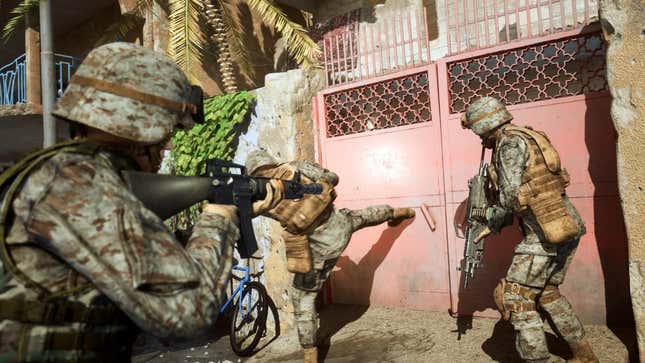
Rebooted war crime simulator Six Days in Fallujah got its official gameplay reveal yesterday in a new trailer that seems to confirm some people’s criticisms of the game as one-sided propaganda for the U.S. war machine. The trailer was debuted exclusively by IGN, the same website that just days earlier ran an in-depth report on the problems surrounding the game and the apparent one-sidedness with which it would make a “playable documentary” out of one of the deadliest sieges in the U.S.’ invasion of Iraq.
“United States military veteran Sgt. Jason Kyle and the developers at Victura and Highwire Games walk you through the first-ever gameplay video of Six Days in Fallujah, the tactical first-person shooter with procedurally generated mission spaces based on real-life events from 2004's Second Battle for Fallujah in the Iraq War,” IGN’s description of the free publicity reads.
The video focuses on the squad tactics you’ll use to break into people’s homes and “clear” them of “enemies.” It highlights how layouts will constantly change to capture the feeling of not knowing what you’ll find every time you step into a new room. The gameplay ends with the player busting into a room where a family of four hides in the corner hoping to not get murdered. The video then cuts to real-life documentary footage as a resident of Fallujah explains that their dad refused to leave the city during the assault.
What it doesn’t mention is that many people were forcibly kept from leaving the city.
“As [the U.S. military] believes many of Fallujah’s men are guerrilla fighters, it has instructed U.S. troops to turn back all males aged 15 to 55,” the Associated Press reported in 2004.
The trailer doesn’t mention accounts of indiscriminate gunfire by the U.S. military either, or that it reportedly used white phosphorus in the attack, a chemical that literally melts through your body. The total number of deaths since the invasion of Iraq began is disputed, but the Iraq Body Count project currently estimates 288,000 people have died, the majority being civilians. And reporters who covered the war have documented the litany of excuses from the U.S. government defending these deaths as anything but war crimes.
It’s this side of the history that IGN dug into just last week in an important piece of reporting titled “Six Days in Fallujah Is Complicated and Painful For Those Connected to the Real Events.” The article interviews several people—Alex, a Lebanese-Arab game developer; Yifat Shaik, an Iraqi-Jewish game developer; and a Muslim developer who wished to remain anonymous—about their concerns and skepticism regarding yet another shooter glorifying the sacrifices of those in the U.S. military.
“Basically when we look at a piece of media we have to ask ourselves: What is it trying to tell us? Who is it serving? Who will have the most to gain from the acceptance of this media is the truth?...I would argue that it is not the Iraqi civilians,” Shaik told IGN.
As a six-minute commercial for the game, these aren’t the types of questions the latest trailer is concerned with. When Peter Tamte, the head of the original studio behind the game and its current publisher, was pressed on these issues in yet another interview, this time on the latest episode of IGN’s Unfiltered, he didn’t have any real answers. Iraqi stories and testimonials were obtained for the game but will make up a much smaller portion of the game than the first-person tactics deployed by U.S. marines. He described the invasion of Iraq not as a grave injustice with a staggering death toll but as “controversial.”
“It’s really bothered me that here we have this battle that is one of the most significant battles in the western world in nearly half a century, but Hollywood has been afraid to tell these stories. Just because the war in Iraq was controversial doesn’t mean that it isn’t filled with stories of sacrifice,” Tamte told IGN’s Ryan McCaffrey.
Whose sacrifices get elevated and publicized, however, is precisely the issue.
“Very few people are curious what it’s like to be an Iraqi civilian,” Tamte said in a previous interview with Gamesindustry.biz. “Nobody’s going to play that game. But people are curious what it’s like to be in combat. It’s the same reason people play survival horror games—being in a situation that is beyond what we have in our normal lives. Ultimately, the reason why people are going to play this game is because they want a more realistic combat experience. That above all else is the experience that we must deliver.”
Six Days in Fallujah may end up being a critical look at the myriad ways people suffered during the battle—and at whose hands—but time and again the game’s shooter marketing has cut against that possibility. Everyone can and should interrogate how the game is shown, whether it should even exist, and what it ends up being. What you don’t need to do is host and elevate a trailer that white-washes a shameful moment in history into a tactical simulation.
Six Days in Fallujah is a shooter because that’s what sells. But no one else has to help them do it.
.